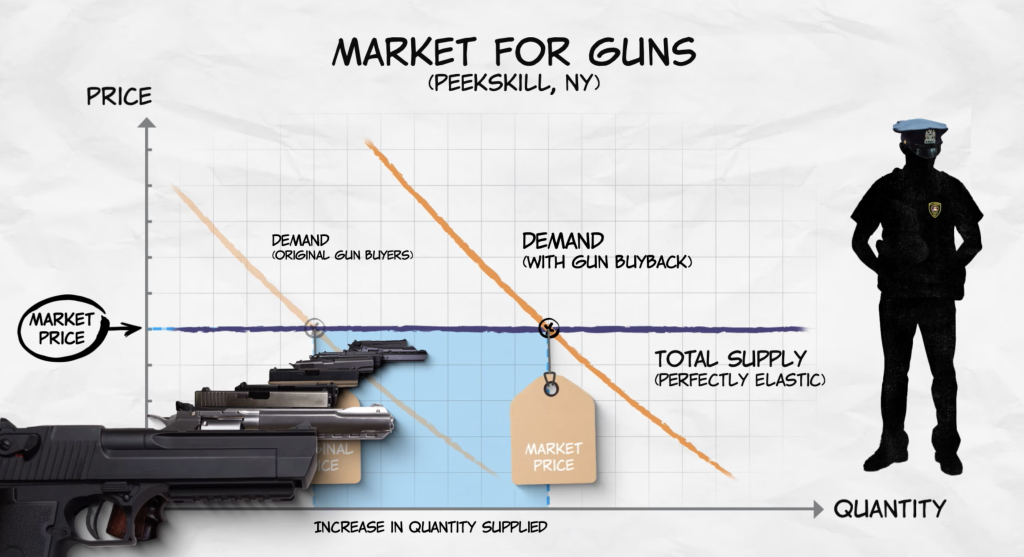
A recent piece at The Atlantic shows us that giving up on gun “buybacks” is an idea that may finally be going mainstream among progressives. The reason is simple: they just don’t work. At least, not if the goal is to reduce “gun violence.”
Those of us who know much about guns, criminals, or have even a lick of common sense knew all along that “buybacks” (how can you buy something back that you didn’t sell?) never had a prayer of working. Criminals don’t just give up their guns, regardless of what the law says or whether someone wants to pay for them. So all these kabuki public relations exercises in political virtue signaling do is take guns up from people who weren’t the problem to begin with.
But in the absence of common sense, some people need hard data. While the anti-gun crowd doesn’t seem to like data very much when it doesn’t confirm their biases (they’ve been caught doing stuff like this repeatedly), there has to come a point where there’s simply so much data that they can’t bury or ignore it any more.
That’s what appears to finally be happening around buybacks. There have simply been too many studies showing that they do virtually nothing to reduce crime and violence. So now even mainstream anti-gun lefties are having to face facts.

One really cool thing that The Atlantic’s piece did was its deeper dive into the “why” of the failure of buybacks. After all, if the “all guns are bad” theory of gun violence has any truth to it, then gun buybacks should make at least some dent in the violence problem. So there was a pressing need to figure out why they’re such a failure.
One great resource the author points to is George Mason University Professor Alex Tabarrok who has applied some basic laws of economics to the question at hand.
Tabarrok shows that the elasticity of the supply of guns in America makes local buybacks utterly useless. Because there are so many guns available — both used and new — across the United States, people living in any one area simply can’t buy enough guns to affect the number of guns on the streets.
In this situation, the supply curve is “perfectly elastic.” Anyone in America can get a widget (or a gun) for the market price and no one in any particular town or city can do can affect the price of guns.
The principle applies to any commodity. If everyone in an area — Tabarrok uses Peekskill, New York as an example — stopped buying gasoline, for example, the overall price of gas wouldn’t be affected.
When it comes to a gun buyback, a new buyer temporarily enters the market. Not only are regular people buying guns as they normally do, but the police, the local government, or some other agency offers to buy them up in hopes that they’ll reduce the supply. But these “buybackers” aren’t just operating in the local market. There’s a regional, national and even something of a global market for guns. Their little buyback is a minuscule drop in the bucket that doesn’t even make a ripple.
Overall demand for guns doesn’t change. Guns will still come into the local market (legally or otherwise) to replace the few dozen guns bought up in the buyback.
Even if enough guns are somehow purchased to raise the price of guns (a very big if) that would only results in more people selling their guns or 3D-printing them to fill the overall demand and make a buck.

The lesson here: you can’t repeal the laws of economics no matter how hard hoplophobes and gun control advocates may try. People running buybacks are doing nothing but wasting their (or, more likely, taxpayers’) money.
Where I disagree with Tabarrok is on the application of economics in a place like Australia. While they may serve as an anecdotal example of the gun supply dropping when buybacks are combined with criminal penalties for violating prohibition, we also need to compare Australia to Mexico, where the same kind of gun control obviously isn’t working. Or, say, Taiwan, where strict gun control hampers military and civil defense efforts and endangering the very existence of the country.
But his application of elasticity to the United States is spot-on. Gun buybacks simply don’t change buying behaviors here in the least. Just as many people want to own guns and just as many companies work to fill that demand.
The Atlantic’s article points out one kind of buyback that sort of works. A constantly-on program, where law enforcement, as a permanent policy, will buy a gun for a set price, no questions asked, can work to change the supply a little. This kind of program sets a price floor on the gun trade, because no one will want to sell guns for a lower price.
At the same time, artificially raising the price floor would most negatively affect poor and marginalized groups in society, robbing them of their ability to defend themselves. So any fair and honest application of “social justice” — something we won’t get from authoritarian progressives — would make that a bad thing. N0t that they’d let something like that stop them from doing everything possible to disarm as many people as they possibly can.


So I tried to post this earlier, and nothing showed up. Trying again…
Tell Graham that buybacks aren’t a total waste. Boch has taught a lot of kids safe firearm handling, and I kinda like to get Gunbusters parts kits in the mail.
“So I tried to post this earlier, and nothing showed up. Trying again…”
There was a recent *massive* solar flare, and those can ‘glitch’ the internet, especially the undersea fiber cables.
The reason is that the earth’s magnetic fields penetrate the ocean and spike the high voltage electricity wiring inside those cables. The power is needed to run the ‘repeaters’ that periodically ‘boost’ the laser signal.
It has to be high voltage because of the thousands of miles it has to travel to get to those repeaters in the middle of the cable run. Simple resistance eats up most of the electricity powering that cable…
It is an endemic disease of Leftist/fascists that they lack even the SLIGHTEST familiarity with Economics. Yes, it can be a challenging subject, but an intelligent person can explain the basics to a chimpanzee. Leftist/fascists INTENTIONALLY ignore Economics because the actual real world is “icky” to them. There was a poster/meme, when I was in college, that read “I have given up my search for truth, and am now looking for a good fantasy”. The Leftist/fascists are convinced that communism/socialism will “work” if we just keep doing it more/harder (notwithstanding its universal failure in the real world). “Good intentions” are equal to (or better than) actual outcomes for them. It is, quite literally, their religion, and they believe in the absence of ANY evidence supporting their idiot delusions. Leftism is a mental disease.
“It is an endemic disease of Leftist/fascists that they lack even the SLIGHTEST familiarity with Economics.”
Oh, they’re plenty familiar with it, they simply choose to ignore it.
They are convinced their ‘magical thinking’ is the correct one, and ignore simple human nature. That’s what drives their urge for no cash bail for violent criminals.
“If we’re nice to them, they won’t hurt us.”…